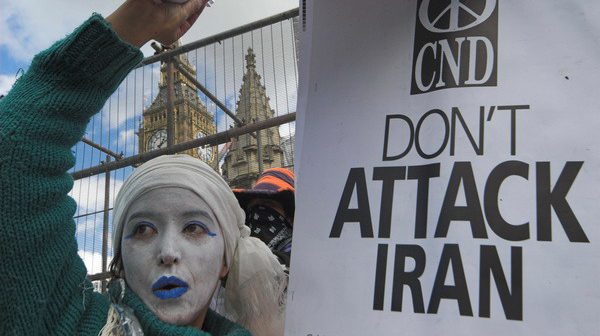Kate Hudson writes: As the situation in the Gulf gets more dangerous by the day, responsibility for the escalating crisis has to be laid at the appropriate door. There can be no doubt that the driving force is the long-standing US drive for regime change in Iran. It couldn’t have been clearer in George Bush’s Axis of Evil speech in 2002; now it’s revived with a vengeance by the Trump administration, with John Bolton leading the charge.
The latest development involves UK impounding of an Iranian oil tanker, deemed to be breaking EU sanctions on Syria. Now Iran has returned the favour by seizing a British tanker. Currently the British government has ruled out a military response but the US may use this as part of its build up to war.
The origins of this latest crisis lie with US withdrawal from the Iran nuclear deal. The re-imposed sanctions have devastated the Iranian economy and while the EU – including the UK – seeks to maintain the agreement, the economic steps they have taken to alleviate the impact on Iran, via Instex – are so far wholly inadequate. This must be rectified: US bullying cannot be allowed to destroy such a valuable agreement and stoke the flames of war.
For those who doubt US culpability for so many elements of this crisis and prefer to point the finger at Iran, I would reference those who describe recent events as Pompeo’s ‘Gulf of Tonkin’ incident against Iran. This refers to the events in 1964 where a naval confrontation between the US and North Vietnam in the Gulf of Tonkin was misrepresented by the US to justify greater US military engagement in Vietnam, leading to a full-on war in which millions were killed.
No one should rush to any judgement without evidence, but it should be noted that the US has form – as does the UK – when it comes to Iran. In 1953, the US and UK governments worked together to overthrow the democratically elected Iranian prime minister, Mohammad Mossadegh. Their goal was to retain US and UK control over Iranian oil reserves, which he had sought to limit. The failure of the Anglo-Iranian Oil Company to comply with Mossadegh’s attempts to audit the company’s documents led the Iranian parliament to nationalise Iran’s oil industry. The coup followed shortly afterwards and the rule of the despotic Shah was strengthened.
Some might say this is a jaundiced view, but that is not the case. Sixty years later, in August 2013, the US government released documents that formally acknowledged the role of the US in both planning and executing the coup. The CIA admitted that the coup was carried out under CIA direction, as an act of US foreign policy, ‘conceived and approved at the highest levels of government’.
Those willing to throw around accusations without irrefutable evidence should take a warning from history: from 1964 and the false flag attack which led to the appalling war on Vietnam, and from 1953 and the illegal and unforgivable intervention against a sovereign country and its democratically elected leader.

